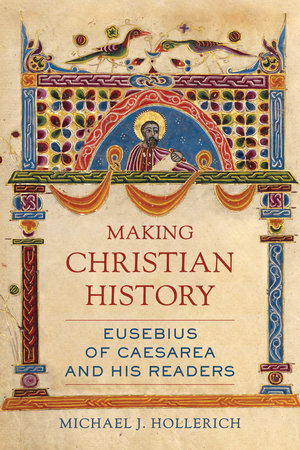By Michael Hollerich, author of Making Christian History: Eusebius of Caesarea and His Readers
As I was finishing work on my new book, Making Christian History, Christopher Beeley—who at the time was the editor of the Christianity in Late Antiquity series—commented that I had been preparing my whole life to do this book.
He wasn’t wrong. I’ve been preoccupied for my entire career with the issues and the sources that underlie this book. Its ultimate roots are in my college years, during the ferment caused by the Second Vatican Council. The council stimulated arguments over “true and false tradition” (Yves Congar) and led me to a virtual double major in theology and history. In a two-year program at Harvard, I kept to the same dual track. The theological influence came from Bernard Lonergan, whose book on theological method was about to be published. Lonergan helped me think about how to reconcile the conditional character of historical judgment with deeper questions of worldview and conversion. Church historian George Huntston Williams introduced me to Erik Peterson’s Monotheismus als politisches Problem (1935) and its thesis about early Christianity’s near seduction by what Peterson called “political theology.” His narrative named Eusebius as a major culprit.
That little book shaped much of my later development in two different ways. First, it led me to the study of Peterson’s better known friend Carl Schmitt, who disgraced himself as an apologist for the Nazi dictatorship (Eusebius became a proxy during their bitter falling out). For the past twenty years, I’ve taught and wrote on political theology and modern German Catholic history. Second, in my doctoral dissertation at Chicago on Eusebius’ Commentary on Isaiah, Peterson’s critique of Eusebius became a foil against which I framed my thesis, which argued that Eusebius was misunderstood if one focused too narrowly on the Constantinian literature and ignored the biblical exegesis.
My introduction to Eusebius was Robert Grant’s seminar on Eusebius’ Ecclesiastical History (HE). In using Eduard Schwartz’ GCS edition of the HE, I noticed that Schwartz named a Gallican bishop, Charles de Montchal, as the sponsor of Henri Valois’ 17th c. critical edition of the HE, which Schwartz greatly admired. That led me to wonder whether Eusebius was being used in the 17th century as support for Gallican ecclesiology and/or royalist political theology. In a seminar of Arnaldo Momigliano’s, I had been introduced to “reception history” in the study of classics and of ancient history. Some years ago I decided to try that approach to measure the impact of Eusebius’ book on church history, a subject that he could legitimately claim to have invented.
That has led to the present book. I am not sure how readers will judge its long time frame. Taking such a long view meant I had constantly to move to new periods and new historiographical literatures. But I thought there was a real benefit to capturing the influence of Ecclesiastical History—its creation of a genre and its constitutive ideas—over its entire history.
The past generation and a half—beginning with Barnes’ Constantine and Eusebius (1981)—of scholarship on Eusebius has done an immense service by putting him into his own time and place. This work has helped counteract a reflexive anachronism that endowed him with an implausible knowledge of the future—seeing him too much in the light of future partnerships between God and Caesar. Burckhardt’s indictment has never lost its potency. For too long, the Constantinian panegyrics dominated how moderns read him. Any number of presenters at this year’s North American Patristics Society conference have made estimable contributions to correcting this imbalance.
With Making Christian History, I have tried to do something different. While giving due credit to their efforts, I wanted to look at how Ecclesiastical History survived and influenced later ages and religious cultures, as well as what that tells us about how Christians (and also non-Christians) understood themselves and their past. To borrow a usage from German scholar Dorothea Weltecke, a student of the universal history of Michael the Syrian, I wanted to see works of history as themselves historical events, a methodological turn in the study of ancient historiography in general (see John Marincola, A Companion to Greek and Roman Historiography, 2007).
At the risk of wandering into a minefield, I want to suggest that it’s healthy for us not to get locked into late antiquity in a way that obscures the larger significance of the period and its literature and material remains. I think it’s stunning that Liz Clarke, who did so much to energize and inspire the study of the period in novel ways, devoted the last ten years of her life to investigating the origins of the study of early Christianity in the United States in Protestant seminaries and divinity schools (George Williams got into her footnotes, thanks to his connection with George LaPiana). This was not at all a predictable turn in her work. But in doing so, she not only contributed to the cultural study of the U.S., she uncovered institutional and conceptual linkages that put much of what goes on in NAPS in a new light.
I can’t make any such claims. I do hope that I was able to place Eusebius in a broader historiographical stream and also to link him to current thinking on topics for which he will always be some kind of touchstone. The chapters I took the most pleasure in writing were chapter three on the non-Greek Christian East, and chapter six on Eusebius in early modernity and the Republic of Letters. As for further work, it might interesting to see if Eusebius left any trace in Arabic historiography. The work of younger scholars like Maria Conterno points where such research might go.
Making Christian History is part of the Christianity in Late Antiquity series



